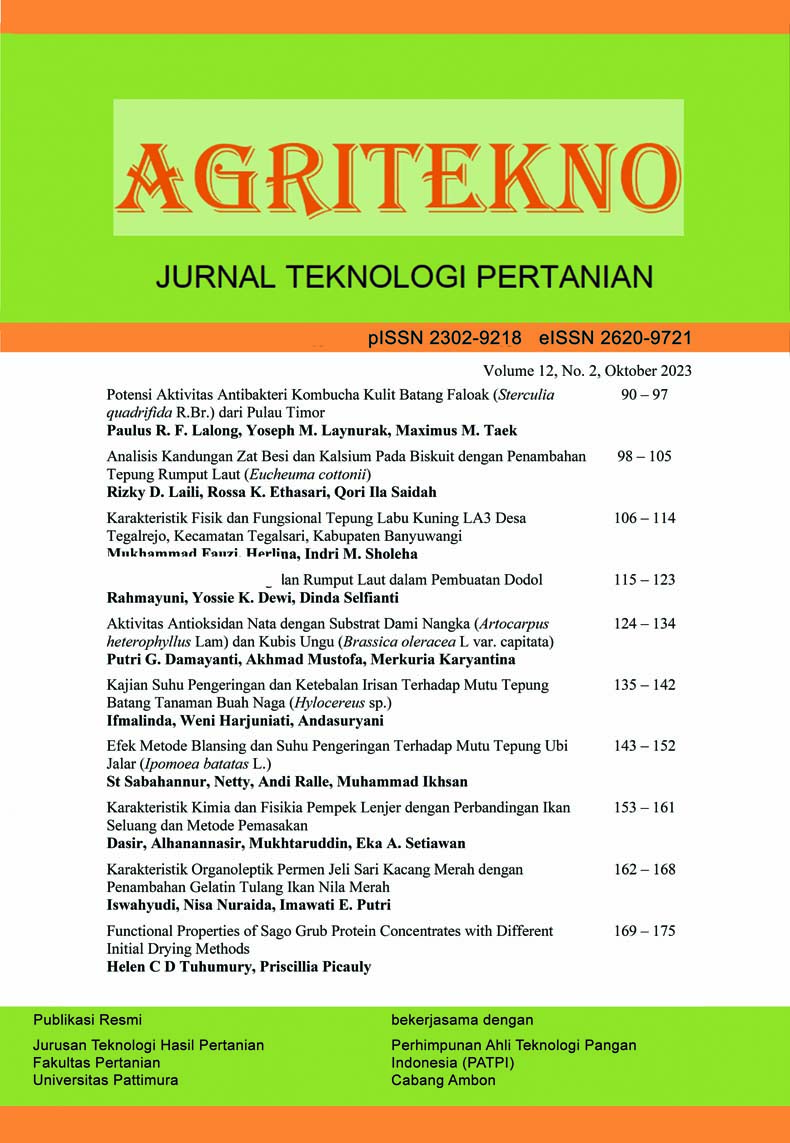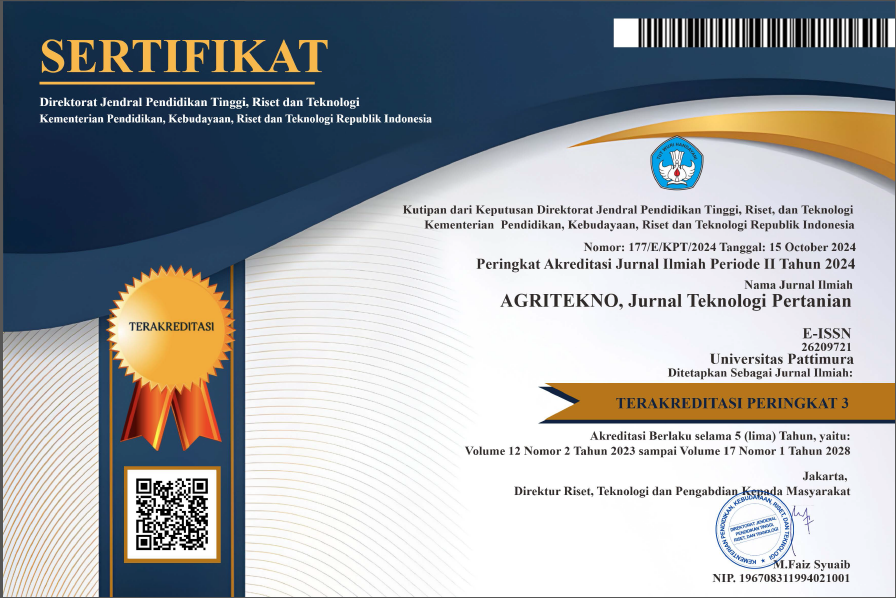Analisis Kandungan Zat Besi dan Kalsium Pada Biskuit dengan Penambahan Tepung Rumput Laut (Eucheuma cottonii)
Analysis of Iron and Calcium Content in Cookies with Addition of Seaweed (Eucheuma cottonii) Flour
Abstract
Seaweed is an eminent commodity of marine resources that has a complete nutritional content of both macronutrients and micronutrients, as well as polyunsaturated fatty acids. This study was conducted to determine the content of iron and calcium in cookies by adding seaweed as an alternative snack. This study was designed using 4 formulations: P1 (0% seaweed flour addition), P2 (10% seaweed flour addition), P3 (20% seaweed flour addition), and P4 (40% seaweed flour addition). This study used the complete randomized design method, which was then tested for iron and calcium content in seaweed cookies using the AAS method. Organoleptic tests were carried out to determine the most accepted formulation. The results showed that cookies with the addition of 20% seaweed flour have the most accepted organoleptic quality and have a fairly high iron content of 42 ppm and calcium content of 1458.28 ppm so they can be used as an alternative food high in iron and calcium and still have an acceptable taste.
Downloads
References
Agustin, A., Saputri, A. I., & Harianingsih, H. (2017). Optimasi pembuatan karagenan dari rumput laut aplikasinya untuk perenyah biskuit. Jurnal Inovasi Teknik Kimia, 2(2). http://dx.doi.org/10.31942/inteka.v2i2.1944
Ak, B., Avsaroglu, E., Isik, O., Özyurt, G., Kafkas, E., & Etyemez, M. (2016). Nutritional and physicochemical characteristics of bread enriched with microalgae Spirulina platensis. International Journal Enginering Research Applied, 6(9).
Astawan, M., Koswara, S., & Herdiani, F. (2004). Pemanfaatan rumput laut (Eucheuma cottonii) untuk meningkatkan kadar iodium dan serat pangan pada selai dan dodol. Jurnal Teknologi dan Industri Pangan, 15(1), 61-69.
Arifah, S. (2020). Faktor kejadian anemia pada pasien kanker yang mendapat radioterapi dan atau kemoterapi. Jurnal Kesehatan, 11(1), 29-36. http://dx.doi.org/10.26630/jk.v11i1.1629
Ballestero-Fernández, C., Varela-Moreiras, G., Úbeda, N., & Alonso-Aperte, E. (2021). Nutritional status in Spanish adults with celiac disease following a long-term gluten-free diet is similar to non-celiac. Nutrients, 13(5), 1626. https://doi.org/10.3390/nu13051626
Breemer, R., Palijama, S., & Jambormias, J. (2021). Karakteristik Kimia dan Organoleptik Sirup Gandaria dengan Penambahan Konsentrasi Gula. AGRITEKNO: Jurnal Teknologi Pertanian, 10(1), 56-63. https://doi.org/10.30598/jagritekno.2021.10.1.56
Canalis, M. B., Leon, A. E., & Ribotta, P. D. (2019). Incorporation of dietary fiber on the cookie dough. Effects on thermal properties and water availability. Food Chemistry, 271, 309-317.
Cheng, Y. F., & Bhat, R. (2016). Functional, physicochemical and sensory properties of novel cookies produced by utilizing underutilized jering (Pithecellobium jiringa Jack.) legume flour. Food Bioscience, 14, 54-61. https://doi.org/10.1016/j.fbio.2016.03.002
Erawati, C. M., Suryani, N., & Nasriyah, Z. (2018). Pengaruh formulasi tepung komposit (tepung terigu, tepung tempe dan tepung jerami nangka (Artocarpus heterophyllus)) terhadap kadar protein, serat kasar serta daya terima cookies sebagai makanan selingan anak obesitas. Jurnal Kesehatan Indonesia, 8(2), 62-68.
Gupta, S., & Abu-Ghannam, N. (2011). Recent developments in the application of seaweeds or seaweed extracts as a means for enhancing the safety and quality attributes of foods. Innovative Food Science & Emerging Technologies, 12(4), 600-609. https://doi.org/10.1016/j.ifset.2011.07.004
Gutiérrez Cuesta, R., González García, K. L., Hernández Rivera, Y., Acosta Suárez, Y., & Marrero Delange, D. (2017). Marine algae, potential source of macronutrients. Revista de Investigaciones Marinas, 37(2), 16-28.
Fradinho, P., Raymundo, A., Sousa, I., Domínguez, H., & Torres, M. D. (2019). Edible brown seaweed in gluten-free pasta: Technological and nutritional evaluation. Foods, 8(12), 622. https://doi.org/10.3390/foods8120622
Gultom, S. O., Zamalloa, C., & Hu, B. (2014). Microalgae harvest through fungal pelletization—co-culture of Chlorella vulgaris and Aspergillus niger. Energies, 7(7), 4417-4429.
Jan, R., Saxena, D. C., & Singh, S. (2016). Physico-chemical, textural, sensory and antioxidant characteristics of gluten–Free cookies made from raw and germinated Chenopodium (Chenopodium album) flour. LWT-Food Science and Technology, 71, 281-287. https://doi.org/10.1016/j.lwt.2016.04.001
Kemenkes. (2019). Peraturan Menteri Kesehatan Republik Indonesia Tentang Angka Kecukupan Gizi yang Dianjurkan Untuk Masyarakat Indonesia.
Kono, T., Obata, Y., Wu, Q., Niwa, K., Ono, Y., Yamamoto, Y., ... & Ogawa, H. (2004). Birth of parthenogenetic mice that can develop to adulthood. Nature, 428(6985), 860-864. https://doi.org/10.1038/nature02402
Kumoro, A. C., Johnny, D., & Alfilovita, D. (2016). Incorporation of microalgae and seaweed in instant fried wheat noodles manufacturing: Nutrition and culinary properties study. International Food Research Journal, 23(2), 715-722.
Kurniawan, D. (2016). Karakteristik tepung rumput laut (Eucheuma cottonii). In National Conference of Applied Engineering, Business and Information Technology, Politeknik Negeri Padang. ASCNI-Tech. 346-361.
Matanjun, P., Mohamed, S., Mustapha, N. M., & Muhammad, K. (2009). Nutrient content of tropical edible seaweeds, Eucheuma cottonii, Caulerpa lentillifera, and Sargassum polycystum. Journal of Applied Phycology, 21(1),75-80. https://doi.org/10.1007/s10811-008-9326-4
Mendes, M. C., Navalho, S., Ferreira, A., Paulino, C., Figueiredo, D., Silva, D., ... & Speranza, L. G. (2022). Algae as food in Europe: an overview of species diversity and their application. Foods, 11(13), 1871. https://doi.org/10.3390/foods11131871
Nieves, J. W. (2005). Osteoporosis: the role of micronutrients. The American journal of clinical nutrition, 81(5), 1232S-1239S. https://doi.org/10.1093/ajcn/81.5.1232
Noorfarahzilah, M., Lee, J. S., Sharifudin, M. S., Mohd Fadzelly, A. B., & Hasmadi, M. (2014). Applications of composite flour in development of food products. International Food Research Journal, 21(6), 2061-2074.
Oh, H., Lee, P., Kim, S. Y., & Kim, Y. S. (2020). Preparation of cookies with various native seaweeds found on the Korean coast. Journal of Aquatic Food Product Technology, 29(2), 167-174. https://doi.org/10.1080/10498850.2019.1707925
Peinado, I., Girón, J., Koutsidis, G., & Ames, J. M. (2014). Chemical composition, antioxidant activity and sensory evaluation of five different species of brown edible seaweeds. Food Research International, 66, 36-44. https://doi.org/10.1016/j.foodres.2014.08.03
Princestasari, L. D., & Amalia, L. (2015). Formulasi rumput laut Gracilaria sp. dalam pembuatan bakso daging sapi tinggi serat dan iodium. Jurnal Gizi Dan Pangan, 10(3). https://doi.org/10.25182/jgp.2015.10.3.%25p
Rahayu, W. P. (2001). Penuntun praktikum penilaian organoleptik. Jurusan Teknologi Pangan dan Gizi. Fakultas Teknologi Pangan. IPB. Bogor.
Raja, A. L., Sumarto, & Ira S. N. (2014). Pengaruh Penambahan Tepung Rumput Laut (Eucheuma cottonii) dalam Jumlah Berbeda Terhadap Karakteristik Mutu Nugget Ikan Patin (Pangasius hypophthalmus). Skripsi. Fakultas Perikanan dan Ilmu Kelautan. Universitas Riau.
Rehena, Z., & Ivakdalam, L. M. (2018). Utilization of Eucheuma cottonii and Sargassum crassifoliumin sago cookies to increase iodine levels of Rattus novergicus. Agrikan: Jurnal Agribisnis Perikanan, 11(2), 74-80. https://doi.org/10.29239/j.agrikan.11.2.74-80
Roohinejad, S., Koubaa, M., Barba, F. J., Saljoughian, S., Amid, M., & Greiner, R. (2017). Application of seaweeds to develop new food products with enhanced shelf-life, quality and health-related beneficial properties. Food Research International, 99, 1066-1083. https://doi.org/10.1016/j.foodres.2016.08.016
Rubio, C., Napoleone, G., Luis-González, G., Gutiérrez, A. J., González-Weller, D., Hardisson, A., & Revert, C. (2017). Metals in edible seaweed. Chemosphere, 173, 572-579. https://doi.org/10.1016/j.chemosphere.2017.01.064
Safitri, W. (2019). Pengaruh Penambahan Tepung Susu Sebagai Bahan Pengikat Terhadap Kandungan Nutrisi Nugget Ayam. Journal Of Animal Center (Jac), 1(2), 124-138.
Sakinah, N., & Ayustaningwarno, F. (2013). Pengaruh substitusi tepung terigu dengan tepung rumput laut Sargassum sp. terhadap kandungan zat gizi dan kesukaan MP-ASI biskuit kaya zat besi. Journal of Nutrition College, 2(1), 154-161. https://doi.org/10.14710/jnc.v2i1.2093
Slamet, A.S., Hermanto, & Isamu, K.T. (2018). Subtitusi Tepung Rumput Laut (Eucheuma Cottonii) Pada Pembuatan Cookies. Jurnal Sains dan Teknologi Pangan, 3(5), 1713-1723. http://dx.doi.org/10.33772/jstp.v3i5.5229
Sulistyaningsih, S. (2021). Peningkatan nilai tambah dan diversifikasi olahan rumput laut. INTEGRITAS: Jurnal Pengabdian, 5(1), 186-193. https://doi.org/10.36841/integritas.v5i1.962
Suparmi, S., & Sahri, A. (2009). Mengenal potensi rumput laut: kajian pemanfaatan sumber daya rumput laut dari aspek industri dan kesehatan. Majalah Ilmiah Sultan Agung, 44(118), 95-116.
Suryaningsih, S., Said, I., & Rahman, N. (2018). Analisis kadar kalsium (Ca) dan besi (Fe) dalam kangkung air (Ipomeae aquatica Forsk) dan kangkung darat (Ipomeae reptan Forsk) asal Palu. Jurnal Akademika Kimia, 7(3), 130-135.
Syad, A. N., Shunmugiah, K. P., & Kasi, P. D. (2013). Seaweeds as nutritional supplements: Analysis of nutritional profile, physicochemical properties and proximate composition of G. acerosa and S. wightii. Biomedicine & Preventive Nutrition, 3(2), 139-144. https://doi.org/10.1016/j.bionut.2012.12.002
USDA. (2019). Food Composition Databases Show Nutrients List. Diakses 15 Mei 2023. https://ndb.nal.usda.gov/ndb/nutrients
Winarno, F.G. (1997). Kimia Pangan dan Gizi. Cetakan ke-XI. PT.Gramedia. Jakarta.
Copyright (c) 2023 The Author(s)

This work is licensed under a Creative Commons Attribution-ShareAlike 4.0 International License.
Authors who publish with this journal agree to the following terms:
- Authors retain copyright and grant the journal the right of first publication with the work simultaneously licensed under a Creative Commons Attribution License that allows others to share the work with an acknowledgement of the work's authorship and initial publication in this journal.
- Authors are able to enter into separate, additional contractual arrangements for the non-exclusive distribution of the journal's published version of the work (e.g., post it to an institutional repository or publish it in a book), with an acknowledgement of its initial publication in this journal.
- Authors are permitted and encouraged to post their work online (e.g., in institutional repositories or on their website) prior to and during the submission process, as it can lead to productive exchanges, as well as earlier and greater citation of published work (See The Effect of Open Access).









